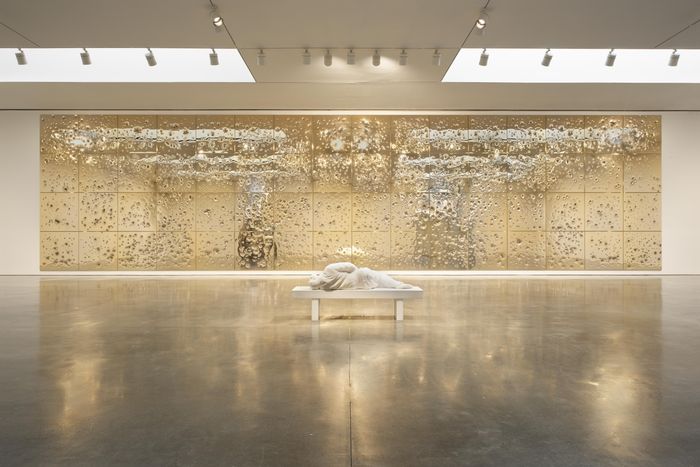
Maurizio Cattelan’s shiny wall sculpture Sunday tackles a weighty subject in a very lightweight way. To create this enormous piece of kitsch, the artist had several marksmen fire over 20,000 rounds of bullets at 64 gold-covered plates in a professional shooting facility in New York. A VIP audience was in attendance, including Jeff Koons, who opined that the end result was “celestial.” At the opening in late April at Larry Gagosian’s gigantic 21st Street gallery, he imprinted the phrase “Beware of Yourself” on people with a stamp. He told The New Yorker’s Calvin Tomkins, “It’s about violence and I use weapons as brushes.”
This obvious decoration adorns the south wall of the gallery. Panels are sold individually for $375,000, according to insiders, making the purchase of the whole set $24,000,000. Collectors love shiny art and enjoy their reflections, so presumably it has sold well, although Gagosian wouldn’t offer an estimate. But the effect is next to nil for something so stylish and highly produced. It’s closer to jewelry, something for the Met Gala, dictator mansions, or Las Vegas hotel lobbies.
Sunday says very little very loudly. America is a gun-violent country and a wealth-hungry country, and if you look into those polished surfaces, you can see yourself. The idea is so simplistic that another artist, Anthony James, debuted an identical work of art on the same day, the difference being that James’s panels are mirror-polished stainless steel and sell for only $40,000 each. These mediocrities say the same thing to everyone in the same way. Philosophically, they flicker and go dead.
I’ve loved Cattelan’s work. His sculptures of a praying Hitler, the pope knocked over by a meteorite, and a JFK wax figure in a wooden coffin are masterpieces. His infamous Comedian, a banana duct-taped to a wall, exemplifies a very rare phenomenon: a terrible work of art that opens interesting aesthetic questions. The show’s curator, Francesco Bonami, is one of the smartest, funniest curators around and the best discoverer of new talent anywhere. I wanted to at least like Sunday.
But obvious art-historical references tumble out of it like clowns from a Volkswagen. Lucio Fontana’s knife-slashed canvases. Jackson Pollock’s border-to-border composition. Yves Klein’s paintings made with flamethrowers. William S. Burroughs shot up everything; Chris Burden asked his friend to shoot him; Valerie Solanas shot Warhol — all these were once seen as radical acts of disruption. Each marked an advancement of modernism’s half-mad evolution. Cattelan does no such thing.
Positioned in front of Sunday is a marble sculpture titled November. A clothed man lies on his side on a bench. He holds his penis as he urinates. He is meant to be the sort of indigent person you pass by on the sidewalk, and its contrast to the gold wall is clear. Not only is it inert, it looks exactly like a Charles Ray sculpture. It comes in an edition of three. Aesthetically, it carries no mystery, complexity, visual oomph, or material originality, and it isn’t even a cute joke. Sunday and November are like Damien Hirst’s $100,000,000 diamond-encrusted human skull: shiny baubles meant to comment on capitalism and to sell.

